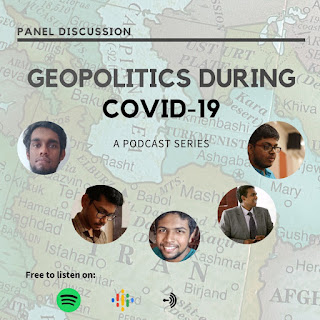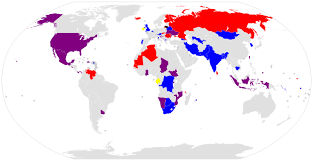Greetings to all readers!!
 It has been 8 months since covid-19 pandemic is taking the world, on a scary roller coaster ride, not knowing when this will end. Politics and International Relations is dynamic, trying to suit the present scenario. Even in the pandemic, we can see that geopolitics is changing to a new normal which we haven't seen ever before.
It has been 8 months since covid-19 pandemic is taking the world, on a scary roller coaster ride, not knowing when this will end. Politics and International Relations is dynamic, trying to suit the present scenario. Even in the pandemic, we can see that geopolitics is changing to a new normal which we haven't seen ever before.
Politics and International Relations is dynamic, trying to suit the present scenario. Even in the pandemic, we can see that geopolitics is changing to a new normal which we haven't seen ever before. With new diplomatic rifts, Geopolitics at the Covid 19 pandemic itself is a going to be a chapter for itself. We present to you this podcast which was recorded on 8th August.
We have kept this podcast exclusively to make the audience aware about the tipping geopolitical issues and as said that Indians are not usually interested in international politics but rather stick with state/national politics and view everything from that prism.
This is going to be a small panel discussion, with the esteemed presence of people with diverse knowledge and perspectives. It is great to have
- Kavith Vishwanath
- Aswin Shanil
- Akhil Sreekumar
- Suraj U Menon
There is no way we can miss out the contribution of Abhiram Vijayakumar who is handling the technical side of the podcast. He is very well experienced in podcasts and runs his own series the MEC Podcast.
Summary of the podcast
The podcast started with a brief introduction of the topic by me as mentioned above. The panellists also introduced themselves. The focus of the entire discussion was on the following topics-
- Analysing Trump's foreign policy
- Rising Anti-China Sentiments
- Hong Kong
- Uighurs
- Trade and Communication
- Territorial disputes
- The new cold war between the US and China
- Foreseeing future- Who will win the US elections?
All panellists are have agreed to the fact that Trump has pretty much harmed the legacy of the United State as a global superpower fighting for world dominance to an ordinary power fighting for its political goals. This backed by right-wing agenda, conservative white supremacy, pro-business, and popular support back home. Trump has pulled out of agreements and backstabbed allies in the name of ''America first''.
On the second topic, the panellist do agree that there is a rising sinophobic sentiment across the globe, but the panel was divided into two terms- the ones who believed that the sentiment came up post-covid-19 outbreak and the ones who claim that "Sinophobia" existed for a much longer time, especially in the western sphere. They also argue that the west was successful in stereotyping China (and the east) from the very beginning. The allegations made by the US on Huawei and Tik Tok was also discussed in brief and how the US is using sanctions and trade war to control its expansionism. The panel pretty much agrees that China, as a rising (economic and military) power is a threat to US global domination.
The previous topic brings us to the next topic, whether the world is turning into a bipolar world with the US as the main pole and China as counterpole. On one hand, the few panellists believe that China has reached a position through the BRI and its military power which is the largest in the world to challenge US presence in the South China Sea. Economically the US is getting weakened and China is the new manufacturing hub, paving way for China to be the largest economy within a few years time. A voice in the panel also claims that the US is allergic of its regime and might look for a regime change in China if possible. China has also demonstrated increasing soft power, and that is going to a challenge for US governments in the years to come. The panel agrees that a war of US-China cannot be inevitable, the war will be driven by technology and economy and not exactly as military-driven as we saw between the US and USSR.
As far as India in the picture, the panel expects India to have a partnership with the US as such at the same time, project itself as a non-aligned pole. The example has been drawn with South Korea, Vietnam and Japan, who have military ties with the US at the same time are large trade partners of China. The discussion ended with an optimistic closing statement from each panellist on the November 3 US elections on who will win it- Trump or Biden. Majority of the panellists disagreed to answer the same clearly but say that the chance is still equal to both. Biden still dominated the opinion as likely winner and better of the two options.
As conclusive remarks, the panel expressed satisfaction in the discussion. The importance of politics and international relations to be discussed as political discourse by students and youth irrespective of the background. Despite missing important topics like Brexit, Iran etc. the conversation was informative.
I thank all the panellists and technical supporter for taking his time and participating in the discussion. I hope that all listeners would have found this interesting and informative at the same time. I am looking forward to the opinion of readers and listen on how the podcast went so I can make a decision whether you want more of this sort. This was my first time in doing a podcast, please forgive for the minor mistakes if there are any.
Do listen to the podcast for a detailed discussion on the same. I know that 1 hr 40 mins is too much for everyone to listen patiently but, you can try putting it on 2x speed if you are running short of time and is impatient. Feel free to get in touch with the panellists for doubts or queries through social media.
This is just a glimpse of the entire podcast, do listen to the podcast from the following links.
Links to the podcast-
-----------------------------------------------------------------------------------------------------------------------------
Thank you all for your patient reading and listening to the podcast.
Do read all posts on this blog by clicking on Info Daily.
Follow me on Medium too... Keep following the blog for more interesting, informative and useful Stories.
1.






Comments
Post a Comment